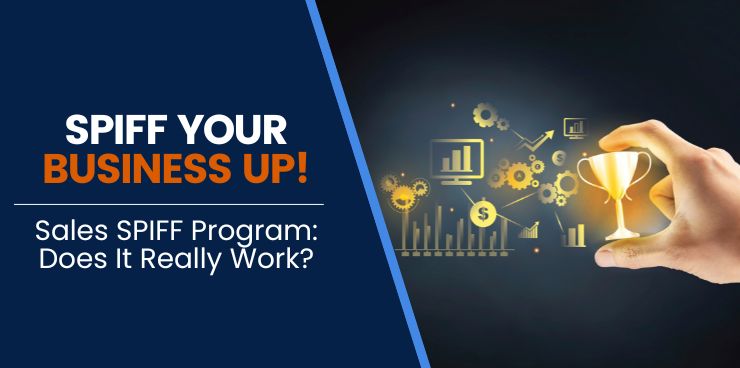The sales department holds the most pivotal role in your company. They present and convert your solutions to your target market. In order to keep morale and intensity at their peak, it’s important to have sales motivation systems in place.
A SPIFF program is one of the most popular motivational strategies for this purpose.
SPIFFs are a type of incentive paid to salespeople to reward them for selling a particular solution. SPIFFs can be used in conjunction with a commission system, or as an alternative to it.
A SPIFF program typically involves setting a company goal to be achieved by the salespeople. For instance, selling X worth of revenue or units in a month, and then offering them a bonus (“SPIFF”) once they reach that goal. Many companies have already established a SPIFF program in their enterprise because it offers several benefits like:
- Temporarily increasing sales revenue or unit volume
- Drawing attention to upselling and cross-selling opportunities
- Getting rid of old, undesirable, or otherwise hard-to-sell products
- Rewarding a desired behavior based on classic conditioning
If you already have commission systems in place, are sales SPIFF still necessary? What better advantages can SPIFFs offer? And more importantly, do SPIFF programs really work?
We’ll answer these questions in this article. Keep reading.
SPIFF vs Commission
The only way to differentiate SPIFFs and commissions is by understanding the context and nature of both concepts. SPIFF and commissions are both performance-based incentives used to motivate sales teams to reach sales targets or drive specific behaviors. The only difference is that a SPIFF program should operate in the short term while commissions are a permanent reward structure.
If you’re looking for immediate sales results, offering SPIFFs can be effective. A SPIFF program is helpful to give your sales team extra short-term motivation. SPIFFs are always monetary in one form or another. You can SPIFF with gift cards, cash, gifts, or time. SPIFF programs are often designed to be contingent on a desired KPI. For example, when reaching a mandated number of units or revenue.
On the other hand, commissions are offered to employees once they close a sale. Normally, commissions are paid as a percentage of the sale or a flat dollar amount depending on the situation. Technically, when you reward your salespeople with a flat commission (eg. $25 for every club membership sold), you are rewarding an action or behavior. If this is a permanent compensation, it is not a SPIFF.
Both are performance-based systems used to drive employee motivation. However, there’s no guarantee that a SPIFF program will yield positive results. Underwhelming SPIFFs and goals that are perceived as unachievable will act as a detractor rather than a motivator. However, having an achievable and valuable SPIFF often gives companies the instantaneous boost it needs when facing a sales or behavioral slump.
If you’re looking for an expert to craft the perfect SPIFF program for your company, consider Wizard of Sales®. Book a call.
SPIFF Programs To Boost Motivation
Your salespeople are the backbone of your revenue. They directly influence the success or failure of your enterprise. That’s why it’s always important to keep them feeling motivated and inspired to drive sales.
According to PRWeb, 9 out of 10 employees agree that employers must reward their employees for great work. However, only half of employees feel appreciated at work. A culture without positive and sincere recognition has a detrimental effect on your business. The fact is, you have no business at all without your people.
A study by Gallup revealed that lack of recognition is one of the major causes of employee turnover. This doesn’t suggest everyone on the team should be rewarded. Gallup recommended that employers recognize their stars, as the more talented an employee is, the more likely they are to leave the company.
I personally believe this notion is incredibly counterproductive. The fact is, when you stop focusing your efforts on your superstars and their outcomes, you will dramatically elevate the positive energy in your tribe. Your best chance of cultivating a happy, healthy, and wealthy culture is to focus your rewards on the actions and behaviors of anyone in your tribe that displays them.
SPIFF programs follow a very similar track – they are designed to incentivize and recognize employees who perform desired actions and behaviors. A SPIFF is a pool of money set aside by the company. This is then used to reward employees who have met or exceeded their intended targets. By taking the necessary actions and behaviors to meet or exceed the desired outcome, a desirable reward is distributed. This is classic conditioning at its finest.
Employee morale and motivation are moving targets. One day your people are bursting with energy and excitement, the next day they are dragging their feet. This is completely normal. After all, nobody is motivated all the time. This is where a well-designed SPIFF program can help leaders form a discipline to put extra effort into the actions and behaviors that drive revenue.
Be careful though. A SPIFF that is extended for long periods of time will continue to generate less of the desired behaviors you are aiming to affect. Furthermore, you will create an expectation and entitlement to the SPIFF, which means you will need to make the SPIFF a commission, or risk upsetting the apple cart. Sorta like always running a sale or discount.
Can SPIFF Programs Work for all Types of Business?
As long as your business has people who sell stuff, a SPIFF program is useful to incentivize and keep salespeople motivated in short bursts. The great thing is that any business can benefit from SPIFFs, including businesses in residential home services.
Unlike other businesses, residential home services sell externally triggered, grudge purchases (required purchases) instead of internally motivated, gratification buys (desired purchases). This means closing sales is more challenging in this industry. In this case, SPIFFs can help facilitate one-sit closes, club membership sales, rehash follow-ups, and outbound call campaigns, to name a few.
There are some common elements that all successful SPIFF programs share. All SPIFF programs should follow the classic SMARTER acronym:
- A specific reward and expectation to reach the goal.
- A simple way to measure progress and tally the results.
- A desired action or behavior that is consistently attainable at volume.
- A realistic set of circumstances to be successful.
- A clear timeline to collect the reward.
- A clear vision of your desired end result.
SPIFF programs should be structured in a way that allows everyone to participate on even ground and be successful.
The key to the success of a SPIFF program is to properly communicate and manage the system with everyone involved. This means having clear and concise communications about the program, as well as regular updates on how salespeople are ranked (also a motivator). A properly designed and implemented SPIFF program will do wonders in delivering the results you need.
 When Should a SPIFF Program Be Used?
When Should a SPIFF Program Be Used?
SPIFFs are an effective way to add further weight to a situation you’re facing. You may wish to clear out old inventory or intensify the focus on a critical product or service. You may have a particularly challenging target or behavior you’re looking to dissuade in a positive manner.
There are a lot of ways to leverage a SPIFF program to affect desired actions and behaviors. Your SPIFF program will ultimately drive short-term revenue or unit goals.
It’s wise to introduce an aggressive, short-term SPIFF program when you’re dealing with difficulties somewhere along these two lines.
Desirable Actions and Behaviors
Disengagement and productivity are real concerns for any business. Optimizing employee productivity is a huge challenge. Sometimes all it takes is a simple external trigger like a SPIFF to get salespeople refocused on what matters. Alternatively, you could just browbeat them into submission…I guess. Instead of your conventional reminders like memos or meetings, SPIFFs are a great way to reinvigorate their momentum.
This way you steer clear of shattering their feigning morale. Moreover, a SPIFF program can stir up excitement and healthy competition in the workplace, motivating salespeople further. When you notice engagement is less than stellar or if conversion rates have taken a slide, SPIFF it up for a minute.
You need quick cash
Whether you need quick cash or are looking to beat a sales quota, a healthy SPIFF is a solid motivator. SPIFFs will increase your sales volume in the short term. In fact, a well-designed SPIFF program is more effective than a customer discount. SPIFFs will give you the much-needed push to reach your goals, especially during a sales slump or shoulder season.
It is wise to employ a SPIFF program sparingly. Overusing SPIFFs will only reduce its efficacy and can even backfire. SPIFFs are only meant to be used on special occasions as an added bonus and not as an ongoing occurrence. Keep them relatively rare to maximize their overall impact. When you do offer a SPIFF, make it worthwhile. Nobody is getting outta bed for five bucks.
 What are examples of SPIFF Programs?
What are examples of SPIFF Programs?
SPIFF programs will vary from company to company. It really depends on what kind of SPIFFs would work best for your business model. You also need to consider what would resonate well with your sales team. There are two options for SPIFF bonuses used in the workplace:
Cash
You can never go wrong with cash. The key to classic conditioning is that the winners get their incentives immediately. Add in the additional external motivator of praise by making it a public celebration with the rest of the tribe. It’s okay to pay them in cold hard cash, as long as your accounting department makes the adjusting entry on their payroll and taxes.
Non-cash
SPIFFs can also take the form of gifts, paid time off, trips, or meaningful experiences. If you believe a pizza party or a set of steak knives are a good reward in 2022, you may be an imbecile. Some cool non-cash SPIFF programs include:
- A spa day.
- Topshelf candy.
- Internal Bonus Bucks, used for in-house purchases (eg. tools, time off, company annual auction).
- An all-expenses-paid trip to an interesting industry conference.
- Uninterrupted time off with their family and loved ones.
- Fancy liquor.
- A special dining experience with people they care about.
- A handmade coupon book from the business (eg. good for 1 day off, 1 screw up, 1 inappropriate swear word slip, etc).
- An Eldorado.
To determine the best SPIFF program rewards, it’s best to ask your employees what they want. Knowing what motivates them is the best SPIFF you could give them. Each and everyone will vary. Commit to giving everyone the bonus they want as your budget allows.
How To Calculate a SPIFF Program
That’s the thing about SPIFF programs, they’re not as mathematical as commissions. The only time you need math for a SPIFF program is when calculating how much your company can spare. For example, can you shed one thousand dollars off your bottom line for every 20 sales they can close in a month? Or can you provide an all-expenses-paid trip for the best performing salesperson in Q1?
That’s where the calculations come in. However, since SPIFF bonuses come with non-cash options, the calculations (and underlying expenses) become less math-reliant.
Perhaps the better question to ask is how to structure a SPIFF program. There are several steps to do this:
- What are your SMARTER goals? The targets you set for your SPIFF program must be specific, measurable, attainable, realistic, time-specific, and have an end result. For instance, your team must sell and install 100% of the 15 HVAC systems in stock of that are non-compliant as of January 1, 2023.When you set the goals precisely, you leave no space for interpretation that raise unwarranted complaints. Plus, achieving the goal is black-and-white; either they achieve them or not.
- What are the rules? What type of HVAC units are considered part of the SPIFF program? Do you require the units to be installed? Are salespeople allowed to offer incentives to prospects to nudge them into buying?
- Who is eligible to participate? Who is allowed to participate in the SPIFF program? What are the eligibility requirements to participate?
- What is the timeframe? When does your SPIFF program begin and when does it end? Clearly identify the deadline to avoid future complications.
- What is the incentive? Be clear whether you are offering cash or non-cash bonuses, and specify the exact amount in question. If you’re letting every individual choose their preferred SPIFF, inform them of the maximum amount you’ll cover.
- Prepare to review the strategy. The review process should not only assess who among your employees hit the target for SPIFF bonuses. It should also consider the ROI it gave your business. If the SPIFF did more harm than good, you can recalibrate your incentive program for the future.
- Always pay out your SPIFF. There is never a situation when you do not pay your SPIFF when earned. Very often when the stakes are high, the targets you lay out to be achieved could be fluffed a little so that if they come close, they still get paid. There is never a more powerful leadership moment than demonstrating extreme generosity to your team.
Common SPIFF FAQs
Here are some common FAQs surrounding your SPIFF program that you may want to know.
Are SPIFF and SPIV different?
SPIFF and SPIV (also SPIF) are all interchangeable terms that are used for similar commission systems. Their only differences lie in what their abbreviated terms represent.
SPIFF has traditionally stood for Sales Performance Incentive Fund Formula. However, there are other meanings to SPIFF that business leaders have used, including:
- Specific Price Incentive for Final Sale.
- SalesPerson Incentive for Fun.
- Special Pay Inceptices for Fast Sales.
SPIV, on the other hand, stands for Sales Performance IncentiVe.
Are SPIFFs legal or illegal?
SPIFFs are completely legal for privately held companies and are not required to follow the same guidelines as publicly traded companies.
Publicly traded companies must follow the Federal Trade Commission’s (FTC) guidelines, and privately held companies should be aware of why.
According to the FTC, SPIFFs must be disclosed to customers of publicly traded companies before they make a purchase. SPIFFs must not be used to bait-and-switch customers or incentivize misleading actions and behaviors in any way.
Why?
Because SPIFF can encourage questionable actions and behaviors among salespeople. Salespeople cannot receive a SPIFF if they’re doing business with the federal government or non-taxable entities. The reason is SPIFFs are considered kickbacks and illegal for government purchases.
Unless you want to live dangerously, it’s best to forego SPIFFs in these specific situations. It’s also best to consult a legal adviser if you have any concerns regarding the legality of a SPIFF program. Seek their advice prior to launching your program to avoid compliance issues or legal recourse.
One thing you must also keep in mind is that SPIFF bonuses, like commissions, are taxable. Furthermore, in many, if not all states, SPIFFs must be calculated into overtime hour calculations and adjusted to achieve the correct calculations.
Is a SPIFF only meant for short-term goals?
The main idea behind a SPIFF program is that it is a quick motivator to achieve short-term targets. They are a one-time activity, cash or non-cash incentive. Whereas commissions are often a flat rate or percentage of the sale that a rep earns in perpetuity.
Unlike commissions, SPIFFs should be a much faster transaction. More often than not, they are released on a weekly or even daily basis. The thing is, the SPIFF is designed for classic conditioning. A reward is given as close to the desired action or behavior as possible, to reinforce the desired action or behavior. The closer the reward is to the action or behavior, the higher the saliency of the reward. The more happy chemicals you can produce in your salesperson’s brain, the more addicted they get to do the desired action or behavior.
So yes, SPIFF is only applicable for achieving short-term goals by reinforcing long-term desirable actions and behaviors.
Make SPIFF Programs Work For You
SPIFF programs are a fantastic way to increase motivation and close sales. Especially for residential home services, this is a great way to get your salespeople fired up in landing sales. If you want your SPIFF program to be successful, here are a few things to keep in mind:
- Understand and communicate your desired end result.
- Focus on incentivizing the salespeople’s actions and behaviors.
- Make sure the SPIFF is achievable and realistic.
- Keep the SPIFF simple and specific. No weasel words.
- Make your SPIFF juicy enough for their mouth to water.
- Define the rules and eligibility criteria clearly upfront.
- Set a timeframe for the SPIFF program.
- Communicate and measure the SPIFF program effectively with your sales team.
- Celebrate the small wins along the way regularly in a public setting.
- Payout your SPIFFs!
By following these tips, you can create a SPIFF program that will help you close more deals. Ultimately, your SPIFF program will help you achieve your short-term business goals. The idea is to make SPIFF programs work for you. Use this strategy sparingly to uphold its rarity and maximize its impact.
The only problem is that getting a SPIFF to work is not always easy even for experienced business owners. If you’re looking for the best SPIFF program to set for your salespeople, Wizard of Sales® can help you. All it takes is booking a call and we’ll get you started on your game-changing strategy.


 When Should a SPIFF Program Be Used?
When Should a SPIFF Program Be Used? What are examples of SPIFF Programs?
What are examples of SPIFF Programs?